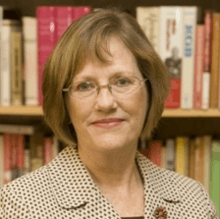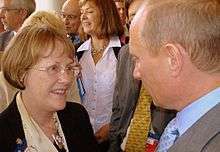Karen Dawisha
| Dr. Karen Dawisha | |
|---|---|
 | |
| Born | 1949 |
| Notable work | Putin's Kleptocracy |
Karen Dawisha (born 1949, Colorado) is an American academic and author. She is a professor in the Department of Political Science at Miami University in Oxford, Ohio and the director of its Havighurst Center for Russian and Post-Soviet Studies.[1][2][3][4]
Early life and education
She received a bachelor's degree from Lancaster University and a Ph.D. from the London School of Economics.[5]
Career
Dawisha has served as an advisor to the British House of Commons Foreign Affairs Committee and as an International Affairs Fellow of the Council on Foreign Relations, and she was a member of the Policy Planning Staff and the Bureau of Political Military Affairs of the U.S. State Department (1985-7). Until the summer of 2000 she was a Professor in the Department of Government and Politics at the University of Maryland and had served as the Director of its Center for the Study of Post-Communist Societies. In 2014, Dawisha received considerable attention for her work detailing the rise and crimes of Vladimir Putin.
Putin's Kleptocracy
Dawisha's latest book, Putin's Kleptocracy: Who Owns Russia? (Simon & Schuster, 2014) has been called "a who's who of the people on the sanctions lists drawn up by America and the EU".[6] It chronicles the rise of Vladimir Putin during his time in St. Petersburg in the 1990s. With painstaking research to support her claims, Dawisha exposes how Putin's friends and coworkers from his formative years have accumulated mass amounts of wealth and power. Although Putin was elected with promises to rein in the oligarchs who had emerged in the 1990s, Dawisha writes that Putin transformed "an oligarchy independent of, and more powerful than, the state into a corporatist structure in which oligarchs served at the pleasure of state officials, who themselves gained and exercised economic control... both for the state and for themselves."[7] As a result, 110 individuals control 35% of Russia's wealth, according to Dawisha. Whereas scholars have traditionally viewed Putin's Russia as a democracy in the process of failing, Dawisha argues that "from the beginning Putin and his circle sought to create an authoritarian regime ruled by a close-knit cabal... who used democracy for decoration rather than direction."[8]
Publication controversy
Dawisha sought to publish Putin's Kleptocracy with Cambridge University Press (CUP), with which she had previously published five books and which had initially accepted the book. However, her 500-page manuscript, a quarter of which was evidentiary footnotes, was rejected by CUP. Editor Jonathan Haslam cited the legal risk of publishing the manuscript in an email of March 20, later published by Edward Lucas in the Economist. Haslam wrote that "Given the controversial subject matter of the book, and its basic premise that Putin's power is founded on his links to organised crime, we are not convinced that there is a way to rewrite the book that would give us the necessary comfort."[9] Dawisha responded that "one of the world's most important and reputable publishers declines to proceed with a book not because of its scholarly quality... but because the subject matter itself is too hot to handle."[9] Dawisha clarified that her indignation was not directed at CUP, but at the climate in Britain that allows "pre-emptive bookburning".[9] Similarly, the Financial Times pointed to "fear of the UK's claimant-friendly libel laws".[10] Dawisha later found a publisher in the US, where the libel laws are less restrictive.
Critical reception
Putin's Kleptocracy has been widely hailed as an "unblinking scholarly exposé"[11] animated by "admirable relentlessness",[12] in which "the power of her argument is amplified by the coolness of her prose".[9] Although some have argued that Dawisha's book unleashes a "torrent of detail" which might "drown readers who are untutored in Soviet and Russian politics",[13] it is nonetheless regarded as "the most persuasive account we have of corruption in contemporary Russia",[13] and the copious detail is celebrated as a strength by others.[14]
Anne Applebaum commended the book's intense "focus on the financial story of Putin's rise to power: page after page contains the gritty details of criminal operation after criminal operation, including names, dates, and figures," and lauded its courage: "Many of these details had never been put together before -- and for good reason."[15]

The most pointed criticism has come from Richard Sakwa, who admitted that the book is "an extraordinary dossier of malfeasance and political corruption on an epic scale" and is "a courageous and scrupulously judicious investigation into the sinews of wealth and power in Vladimir Putin's Russia", but took issue with the term "kleptocracy" and argued that Russian society operates according to a social contract (an implicit agreement between state and populace), which is reflected by the regime's use of some funds for legitimate social purposes.[16] Dawisha has responded to Sakwa's position in a number of public fora, arguing that the notion of a social contract under Putin is seriously problematic. For example, at a London event in 2015, Dawisha fielded a question referencing Sakwa's review, responding:
"When a president talks about his business elite as chickens sitting on eggs... what is the nature of the understanding that they have? … Where is the rule of law in Russia? … the rule of law for Russia is in London. Why is it that $150 billion left the country last year? Because they believe that their wealth can only be secured in the long term outside their own country. So if you don't have the ability to secure your rights, then I don't think there's any political theory that would say that you have a social contract; not even Russian political theory."[17]
Other works
Dawisha's other major publications include: Russia and the New States of Eurasia: The Politics of Upheaval (Cambridge University Press, coauthored with Bruce Parrott, 1994); Eastern Europe, Gorbachev and Reform: The Great Challenge, (Cambridge University Press,1989, 2nd ed., 1990); The Kremlin and the Prague Spring, (California University Press, 1984); The Soviet Union in the Middle East: Politics and Perspectives, (Holmes and Meier for the Royal Institute for International Affairs, 1982); Soviet East-European Dilemmas: Coercion, Competition, and Consent, (Holmes and Meier for the Royal Institute for International Affairs, 1981); and Soviet Foreign Policy Toward Egypt, (Macmillan, 1979).
Edited volumes
As Director of the Russian Littoral Project, Dawisha was the series editor (with Bruce Parrott) of the 10 volume "International Politics of Eurasia", published by M.E. Sharpe, and has also edited several volumes in that series, including: Making of Foreign Policy in Russia and the New States of Eurasia, (coedited with Adeed Dawisha, 1995), The End of Empire? The Transformation of the USSR in Comparative Perspective, (coedited with Bruce Parrott); and The International Dimension of Post Communist Transitions in Russia and the New States of Eurasia, (1997).
Finally, she has coedited with Bruce Parrott a four-volume series published by Cambridge University Press on Authoritarianism and Democratization in Post-communist Societies. The volumes are The Consolidation of Democracy in East Central Europe; Politics, Power and the Struggle for Democracy in South-East Europe; Conflict, Cleavage and Change in Central Asia the Caucasus; and Democratic Changes and Authoritarian Reactions in Russia, Ukraine, Belarus and Moldova.
Awards and fellowships
Dawisha has received Fellowships from the MacArthur Foundation, the Council on Foreign Relations, the British Council, and the Rockefeller Foundation. She was awarded the Distinguished Research Professor prize by the University of Maryland. Funding for the Russian Littoral Project and the Democratization Project came from the MacArthur Foundation, the Ford Foundation, Smith Richardson Foundation, the Social Science Research Council, Pew Charitable Trusts, the National Endowment for the Humanities, the American Council for Learned Societies and the State Department.
Personal life
Karen Dawisha is married to Adeed Dawisha, a professor from Iraq who specializes in Middle Eastern politics, also at Miami University. [18] They have two children.
References
- ↑ http://www.nytimes.com/2014/11/30/books/review/putins-kleptocracy-by-karen-dawisha.html
- ↑ "Karen Dawisha's Putin book blocked by British libel laws.". Slate Magazine. Retrieved 4 October 2015.
- ↑ Adam Taylor (7 April 2014). "The frustrating reason a book detailing Putin's murky past was blocked from publication". Washington Post. Retrieved 4 October 2015.
- ↑ Anna Arutunyan (30 September 2014). "Book Review: 'Putin's Kleptocracy' by Karen Dawisha". WSJ. Retrieved 4 October 2015.
- ↑ "Karen Dawisha – Miami University". miamioh.edu.
- ↑ "Band of brothers". The Economist. November 22, 2014. Retrieved October 3, 2015.
- ↑ Dawisha, Karen (September 30, 2014). Putin's Kleptocracy: Who Owns Russia?. Simon and Schuster. p. 282. ISBN 1-4767-9521-5. Retrieved October 3, 2015.
- ↑ Dawisha, Karen (September 30, 2014). Putin's Kleptocracy: Who Owns Russia?. Simon and Schuster. p. 8. ISBN 1-4767-9521-5. Retrieved October 3, 2015.
- 1 2 3 4 "A book too far". The Economist. April 3, 2014. Retrieved October 3, 2015.
- ↑ "Vladimir Putin and his tsar quality". Financial Times. February 6, 2015. Retrieved October 3, 2015.
- ↑ "Putin's Reaction To Sanctions Is Destroying The Economy And China Won't Help". Forbes. October 14, 2014. Retrieved October 3, 2015.
- ↑ "How He and His Cronies Stole Russia". The New York Review of Books. December 18, 2014. Retrieved October 3, 2015.
- 1 2 "'Putin's Kleptocracy,' by Karen Dawisha". The New York Times. November 24, 2014. Retrieved October 3, 2015.
- ↑ "Library Journal, LJ Reviews". Library Journal. November 2014.
- ↑ "How He and His Cronies Stole Russia". The New York Review of Books. December 18, 2014. Retrieved October 3, 2015.
- ↑ "Is Russia really a kleptocracy?". The Times Literary Supplement. February 4, 2015. Retrieved October 3, 2015.
- ↑ "Event transcript: Putin's Kleptocracy: Who Owns Russia?". The Henry Jackson Society. June 16, 2015. Retrieved October 3, 2015.
- ↑ http://www.users.miamioh.edu/dawisha